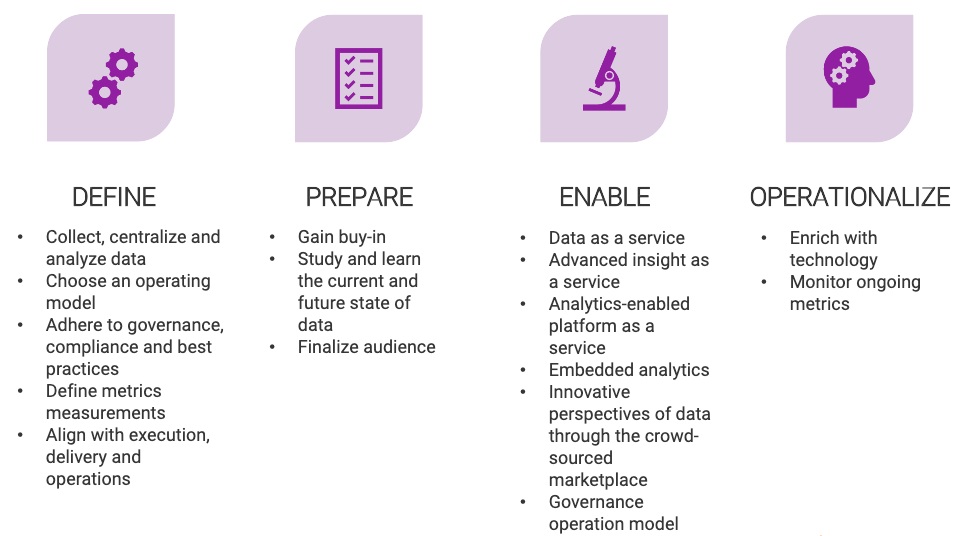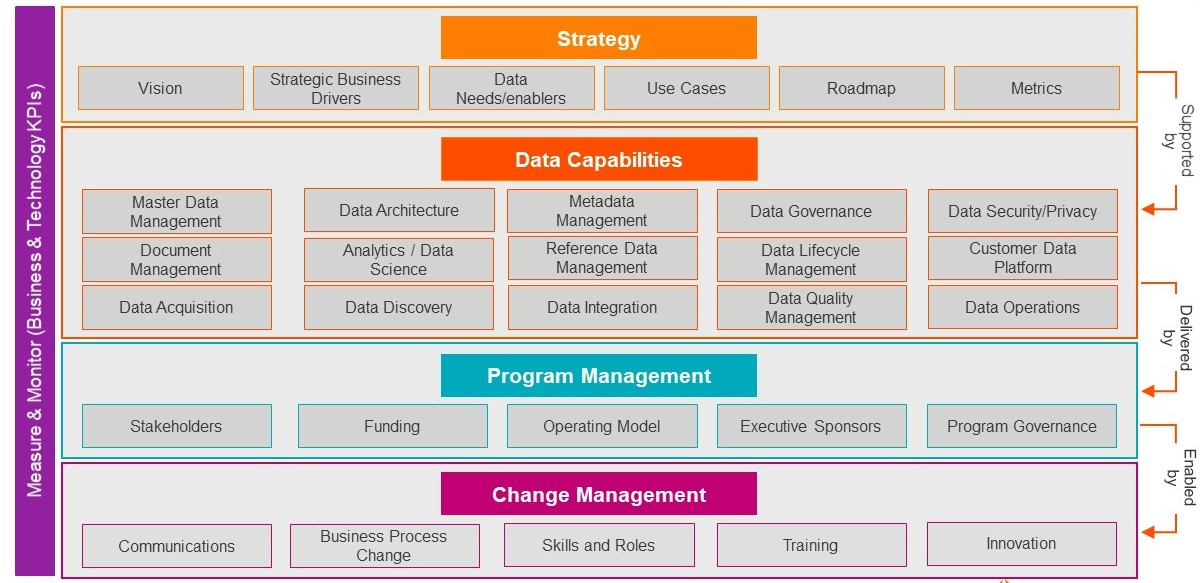Harness Your Data for Economic Benefit with a Solid Monetization Strategy
Last Published: Feb 17, 2023 |

In the first blog of our series on the topic of monetizing data, “Data Monetization: Transform Your Cost Centers into Profit Centers by Leveraging Data Democratization,” we reviewed common myths, benefits, challenges and enterprise capabilities associated with it. In this blog, I will outline the data monetization strategy and operationalization practices, which include ownership, storytelling and defining and measuring value metrics.
Data Monetization Strategy
A comprehensive data monetization strategy should include the following:

Now that a strategy is established, data monetization needs to be operationalized and evangelized at all levels of the organization. This creates awareness within the culture of the cost of data and the value attained.
Who owns data monetization and storytelling?
Ownership and Storytelling
A monetization strategy needs strong ownership. There must also be a plan to use storytelling to operationalize data monetization across the organization. The following are some considerations:
- Identify who is accountable
- CDOs are accountable for transforming data organizations into a profit center
- Office of the CDO is responsible for defining enterprise data analytic components and the investment and operational costs.
- CFOs are accountable for providing oversight and audit
- Office of the CFO is responsible for factoring the cost model for enterprise data analytic components, assessing investment costs, applying depreciation and calculating the return on investment (ROI) and realization period.
- CDOs are accountable for transforming data organizations into a profit center
- Define the value of data
- The value of data is the cost of doing business when carried out without that data and its related processes. Typically, value measurement takes into consideration the following:
- Competitive advantage - It could be the opportunity cost of not having data analytics for decision-making
- Efficiency and innovation – The cost of not having operational data available to make workflow processes efficient and innovative
- Reduced technology debt – The expense of not retiring inefficient, unscalable and maintenance-prone assets
- Operational cost – People's time and technology and the opportunity cost of having to deal with inefficiencies and opportunities lost
- Tell the story
- Though business subject matter experts are better positioned to lead in articulating data monetization as a practice, everyone is accountable for supporting literacy throughout the organization. Following are some thoughts for telling the story:
- Treat data as raw material, finished goods, salvage, etc., and value them accordingly
- Create an ongoing strategy for awareness, communication and engagement
- Develop the story with stakeholders in mind
- Align the story with use cases
- Measure, quantify and qualify
- Share, socialize with key stakeholders and promote the value
- Maximize business value
- Fit for purpose: Begin with the business process and work backwards to determine what data domain to build and what foundation is needed.
- Quick gains: Start with low-hanging fruit and small efforts to yield significant value.
- Operational needs: Combine operational needs (e.g., operational reporting to help manage the work basket in an underwriting process) and analytical needs (e.g., advanced analytical models to predict and control fraud, waste and error) so there is a well-balanced narrative that helps articulate direct financial benefit.
- Create the value measurements
- To get more visibility into the business value, define the precise outcome of the use case and measure value during execution and delivery. Measurement is typically done using the current operational cost of people's time and technology and the opportunity costs of dealing with inefficiencies and technical debt. Program delivery teams provide feedback during the program's tenure. Operational teams can then continue with ongoing measurement and communication.
Informatica’s Role in Data Monetization
At Informatica Advisory Services, we offer strength and depth in data strategy, data management, data governance, MDM, cloud data transformation and business adoption, which are key factors for assessing the data monetization journey. We would be happy to engage with you and guide you on your journey. Figure 1 highlights the building blocks of our data strategy framework, which encompasses the data ecosystem described in this blog post.

Next Steps
We understand that the data-driven metrics outlined above are not new. But only recently has it become a widespread practice to monetize data in alignment with corporate goals.
We look forward to hearing more about your experience on this journey. Please stay tuned for the next installment of my data monetization series focusing on opportunities within the healthcare industry.
If you’re interested in further exploring topics that are top of mind for CDOs, please check out our CDO page.








